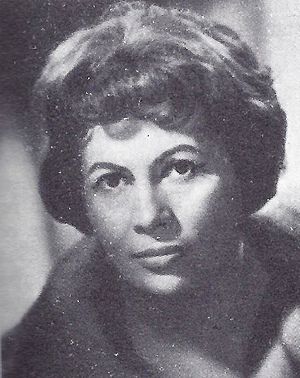Biserka Cvejić facts for kids
Quick facts for kids
Biserka Cvejić
|
|
|---|---|
| Бисерка Цвејић | |

Biserka Cvejić in 1966
|
|
| Born |
Biserka Katušić
5 November 1923 Jesenice, Kingdom of Serbs, Croats and Slovenes
|
| Died | 7 January 2021 (aged 97) Belgrade, Serbia
|
| Occupation |
|
| Organization |
|
| Title | Kammersängerin |
| Spouse(s) | Dušan Cvejić |
| Awards |
|
Biserka Cvejić was a famous Serbian opera singer. She was known for her powerful voice, called a mezzo-soprano or contralto. She was also a university professor. Her amazing singing career started in 1954 at the Belgrade Opera. From 1959 to 1979, she was a main singer at the Vienna State Opera. She also performed all over the world. In 1961, she sang for the first time at the Metropolitan Opera in New York. She played Amneris in the opera Aida.
Contents
Early Life and Training
Biserka Katušić was born in Jesenice, a town near Split. She grew up in a place called Ougrée in Belgium. After World War II ended, she returned to her home country. She traveled hidden on a freight train with help from an American soldier.
When she arrived in Belgrade, she met her future husband, Dr. Dušan Cvejić. He was a doctor who specialized in ears, nose, and throat. Biserka first worked as a translator. Then, she studied singing at the Academy of Music in Belgrade. Her teacher was José Riavez. She finished her studies in 1953.
A Star on Stage
In 1950, while still a student, Biserka got her first chance to sing on stage. She filled in for another singer at the Belgrade Opera. She sang the role of Maddalena in Verdi's opera Rigoletto.
Her official first performance was in 1954. She sang as Charlotte in Massenet's opera Werther. She stayed with the Belgrade Opera until 1959. In 1955, she made recordings with a company called Decca. She sang roles in four different Russian operas. These included Olga in Tchaikovsky's Eugene Onegin.
Vienna State Opera
In 1959, Biserka Cvejić sang for the first time at the famous Vienna State Opera. She played Amneris in Verdi's Aida. The next year, she became a full member of the opera house. She stayed there until 1979. During that time, she performed in 25 different roles. She sang in 372 shows!
One of her most famous roles was the main character in Bizet's opera Carmen. She also played Marcellina in Mozart's Le nozze di Figaro. Other roles included Preciosilla in Verdi's La forza del destino and Brangäne in Wagner's Tristan und Isolde. She also sang as Herodias in Salome by Richard Strauss.
Metropolitan Opera Performances
Biserka Cvejić made her debut at the Metropolitan Opera in New York on April 14, 1961. Again, she sang as Amneris in Verdi's Aida. She performed alongside another famous singer, Birgit Nilsson. A newspaper reviewer said her voice was "generous" and "warm." They also said she looked "regal" and "attractive."
She returned to the Met in 1963. She played the Princess in Cilea's Adriana Lecouvreur. She sang with stars like Renata Tebaldi and Franco Corelli. The same year, she was Ulrica in Verdi's Un ballo in maschera. In 1964, she appeared as Eboli in Don Carlo. She also sang as Azucena in Il trovatore. Later that year, she performed as Giulietta in Offenbach's Les contes d'Hoffmann.
In 1965, she sang the main role in Samson et Dalila. She performed with Jon Vickers as Samson. On November 22, 1966, she played Laura in a new show of Ponchielli's La Gioconda. She sang with Tebaldi and Corelli again.
International Stages
Biserka Cvejić also performed often at the Croatian National Theatre in Zagreb from 1975 to 1978. She sang at many other famous opera houses around the world. These included La Scala in Milan, the Verona Arena, and Teatro di San Carlo in Naples. She also performed at Teatro Colón in Buenos Aires and the Royal Opera House in London.
Her voice was described as dark, beautiful, and very smooth. She was also a great singer of oratorios, which are like operas but without costumes or staging. She stopped performing on stage in 1990.
After the Stage
After she retired from singing, Biserka Cvejić became a teacher. She taught singing at the University of Arts in Belgrade. She also taught at the Musical Academy in Novi Sad, Serbia. Many of her students became famous singers themselves, like the baritone Željko Lučić.
Awards and Honors
Biserka Cvejić received many important awards. She was given the Medal of Arts and Letters of Serbia. In 1979, she earned the title Austrian Kammersängerin. This is a special honor for opera singers in Austria. In 2001, she was given the French Legion of Honor.
Recordings
Biserka Cvejić recorded many of her performances. Here are some of the operas she recorded:
Decca
- Tchaikovsky: Olga in Eugen Onegin
- Tchaikovsky: Polina in Pique Dame
- Borodin: Nurse in Fürst Igor
- Mussorgsky: Hostess in Boris Godunow
- Rimsky-Korsakov: Snegourotchka
MGM-Heliodor
- Prokofiev: War and Peace
Jugoton
- Opera arias
Electrola
- Johann Strauss II: Der Zigeunerbaron
 | John T. Biggers |
 | Thomas Blackshear |
 | Mark Bradford |
 | Beverly Buchanan |

